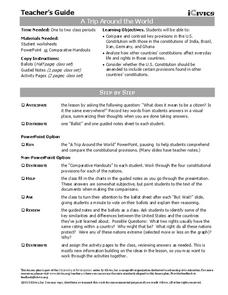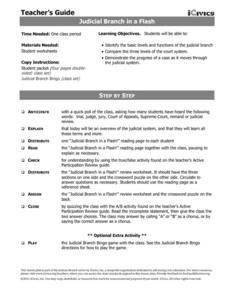Owl Teacher
Creating a Map to My House
Here is a simple assignment that will introduce your young geographers to location, one of the five themes of geography, through an activity in which they map the directions and lines of latitude/longitude of where they live.
Owl Teacher
Introduction to World Geography
Give your learners a thorough overview of what they will learn when studying geography, from the five themes of geography (location, place, environment, movement, and regions) to the tools of a geographer and parts of a map.
Federal Reserve Bank
Journey to Jo’burg: A South African Story
How did South African apartheid affect the ability of people of color to increase their human capital? Here is a rich lesson in which learners come to understand the relationship between investment in human capital and income, while also...
North Carolina Consortium for Middle East Studies
Federalists v. Anti‐Federalists
Here is a solid lesson plan to support your instruction on the Continental Congress and the Articles of Confederation. It includes close analysis of primary source images, a guided notes template and answer key, and many key points to...
Curated OER
What is the Federal System Created by the Constitution?
Explore the unique structure of the federal system of government in the United States. Class members will learn about how most nations were organized before the establishment of the Constitution, how power is currently divided between...
Carolina K-12
Colonialism and American Foundations Sample Test Questions
What was the main cause of European colonization in America? How did Thomas Paine's Common Sense play a role in the establishment of the United States? What was the trans-Atlantic slave trade? These are just a few of the many questions...
Federal Reserve Bank
Ben Franklin: Highlighting the Printer
By studying Benjamin Franklin's work as a printer, your class will have a fantastic opportunity to learn about the economic concepts of entrepreneurship, human capital, and investment.
Curated OER
Vocabulary Charts
Help your kids learn their vocabulary with a lesson plan and graphic organizer. After receiving a list of new vocabulary words, learners look up the definitions in dictionaries and fill in the worksheet. Additionally, they include a...
Curated OER
What is an Atlatl?
Let's go an an archaeological dig! Prepare your kids with a list of vocabulary terms relating to archaeology, including different types of items that one might find. They study pictures of each item and play a memory game based on the...
Center for Civic Education
Women's History Month Word Clouds
What a great idea for celebrating Women's History Month and discovering the amazing efforts that individuals have put forth on behalf of women's rights! Learners take a closer look at the speeches and other primary source documents of...
iCivics
Emphasize Minimize
Encourage your class members to consider what points they are really emphasizing when they are making an argument, whether in writing or in speech. Watch out though, as this lesson may just leave your learners eager to debate you!
iCivics
Conflict & Cooperation
Considering such conflicts as the Vietnam War and the war in Afghanistan, what motivates nations to cooperate? Your class members will analyze past and current international events in order to understand the types of conditions and...
iCivics
A Trip Around the World
How do the rights of citizens in other countries, such as India, Germany, Brazil, and Iran, compare to those of Americans? Take a closer look at the provisions of various foreign constitutions, and compare and contrast the protections...
iCivics
Foreign Policy: War
What is the difference between foreign and domestic policy? What are the primary differences in what the United States hopes to accomplish through foreign aid, the military, and the creation of treaties? Your class members will examine...
iCivics
The Fourth Branch: You!
Take time to remind your young learners of the valuable understanding that each branch of the United States government is really composed of other citizens. The reading material and worksheets of this resource cover the importance of...
iCivics
Government Spending
After discussing personal financing with your class, consider following up with this well-rounded introduction to government spending. The resource includes reading documents and worksheets, and covers topics as the federal deficit and...
iCivics
Judicial Branch in a Flash
What is the difference between the federal court and state court systems? What about criminal versus civil cases? Check out this resource that will offer your class members a general and effective overview of the judicial branch in the...
iCivics
So You Think You Can Argue
What defines an argument, and how can someone properly formulate a counterargument? This resource provides two options—an interactive PowerPoint presentation or worksheet—that will support your learners as they begin to explore how to...
iCivics
Congress
Through reading materials, worksheets, and a primary source activity, this resource provides an overview of the structure and powers of the legislative branch of government in the United States. Readings review how a bill becomes a law,...
iCivics
Why Do We Have a House and Senate, Anyway?
Why does the United States have a bicameral voting system? Through role playing as either advocates for or against a cell phone policy in school, your learners will organize, vote, compromise, and experience first-hand the benefits of a...
iCivics
You've Got Rights!
If aliens invaders nearly destroy the world in the distant future and leaders must decide on a pamphlet of protections to preserve individual rights, what should they include? Introduce the Bill of Rights and the struggle between the...
iCivics
A Very Big Branch
Through detailed secondary source reading material and an interactive "true/false" activity, learners discover the depth and complexity of the executive branch in the United States government. Topics covered include executive...
iCivics
The "Federal" in Federalism
How are states in the United States related to each other? Does the government bind them together? Do states have different governments? After reading about federal power as a whole group, your class members will participate in a...
iCivics
Wanted: A Just Right Government
What type of government did American colonists gain and seek after gaining their independence after the Revolutionary War? Here is activity that will guide your young learners through the new nation's progression from the Articles of...

























